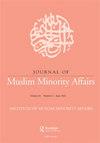以色列阿拉伯青年妇女获得支持的模式和服务消费障碍
IF 0.4
0 RELIGION
引用次数: 0
摘要
摘要:本研究调查了482名年龄在18-26岁的以色列阿拉伯年轻妇女的背景变量、儿童虐待暴露、使用支持模式和服务消费障碍之间的联系。参与者是以色列的阿拉伯公民,通过滚雪球抽样招募。结果表明,他们对服务的了解始终高于他们的消费。大多数参与者认为他们有能力独自管理或在家人或朋友的帮助下管理。超过三分之一的人报告说,他们不信任服务机构帮助他们的能力,文化上的误解,更喜欢匿名提供的服务,以及太多的官僚主义阻碍了服务的使用。儿童期遭受的虐待或忽视越多,对服务使用的满意度就越低,获得服务的障碍也越大。人们发现,贫穷的经济状况和壁垒之间存在着积极的联系。调查结果表明,有必要调整向作为少数民族的年轻阿拉伯妇女提供的服务,以增加她们接受支持的动机。本文章由计算机程序翻译,如有差异,请以英文原文为准。
Patterns of Receiving Support and Barriers to Service Consumption among Young Arab Women in Israel
Abstract
The present study examined the links between background variables, exposure to child abuse, patterns of using support, and barriers to services consumption among 482 young Arab women in Israel aged (18–26). The participants are Arab citizens of Israel and were recruited through snowball sampling. The results show that their acquaintance with services was consistently higher than their consumption. Most participants believed they were capable of managing on their own or with the help of family or friends. More than a third reported distrust in the ability of the services to assist them, cultural misunderstanding, preference of services provided anonymously, and too much bureaucracy as barriers to service use. The greater the abuse or neglect in childhood, the lower the satisfaction with the use of services and the greater the barriers to services experienced. A positive link was found between poor economic status and the barriers. The findings suggest a need for adjustment of the services offered to young Arab women as ethnic minority group to increase their motivation to receive support.
求助全文
通过发布文献求助,成功后即可免费获取论文全文。
去求助
来源期刊

Journal of Muslim Minority Affairs
RELIGION-
CiteScore
1.40
自引率
0.00%
发文量
31
期刊介绍:
Journal of Muslim Minority Affairs is a peer reviewed research journal produced by the Institute of Muslim Minority Affairs (IMMA) as part of its publication programme. Published since 1979, the journalhas firmly established itself as a highly respected and widely acclaimed academic and scholarly publication providing accurate, reliable and objective information. Journal of Muslim Minority Affairs provides a forum for frank but responsible discussion of issues relating to the life of Muslims in non-Muslim societies. The journalhas become increasingly influential as the subject of Muslim minorities has acquired added significance. About 500 million Muslims, fully one third of the world Muslim population of 1.5 billion, live as minorities in 149 countries around the globe. Even as minorities they form significant communities within their countries of residence. What kind of life do they live? What are their social, political and economic problems? How do they perceive their strengths and weakness? What above all, is their future in Islam and in the communities of their residence? The journal explores these and similar questions from the Muslim and international point of view in a serious and responsible manner.
 求助内容:
求助内容: 应助结果提醒方式:
应助结果提醒方式:


